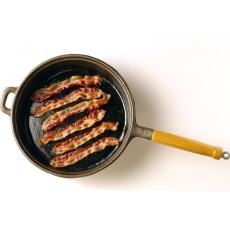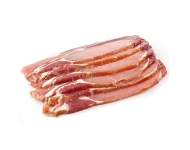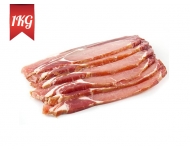Brands
The Nitrate and Nitrite Myth: Another Reason Not To Fear Bacon
Beyond just being loaded with “artery-clogging saturated fat” and sodium, bacon has been long considered unhealthy due to the use of nitrates and nitrites in the curing process. Many conventional doctors, and well-meaning friends and relatives, will say you’re basically asking for a heart attack orcancer by eating the food many Paleo enthusiasts lovingly refer to as “meat candy”.
The belief that nitrates and nitrates cause serious health problems has been entrenched in popular consciousness and media. Watch this video clip to see Steven Colbert explain how the coming bacon shortage will prolong our lives thanks to reduced nitrates in our diets.
In fact, the study that originally connected nitrates with cancer risk and caused the scare in the first place has since been discredited after being subjected to a peer review. There have been major reviews of the scientific literature that found no link between nitrates or nitrites and human cancers, or even evidence to suggest that they may be carcinogenic. Further, recent research suggests that nitrates and nitrites may not only be harmless, they may be beneficial, especially for immunity and heart health. Confused yet? Let’s explore this issue further.
It may surprise you to learn that the vast majority of nitrate/nitrite exposure comes not from food, but from endogenous sources within the body. (1) In fact, nitrites are produced by your own body in greater amounts than can be obtained from food, and salivary nitrite accounts for 70-90% of our total nitrite exposure. In other words, your spit contains far more nitrites than anything you could ever eat.
When it comes to food, vegetables are the primary source of nitrites. On average, about 93% of nitrites we get from food come from vegetables. It may shock you to learn that one serving of arugula, two servings of butter lettuce, and four servings of celery or beets all have more nitrite than 467 hot dogs. (2) And your own saliva has more nitrites than all of them! So before you eliminate cured meats from your diet, you might want to address your celery intake. And try not to swallow so frequently.
All humor aside, there’s no reason to fear nitrites in your food, or saliva. Recent evidence suggests that nitrites are beneficial for immune and cardiovascular function; they are being studied as a potential treatment for hypertension, heart attacks, sickle cell and circulatory disorders. Even if nitrites were harmful, cured meats are not a significant source, as the USDA only allows 120 parts per million in hot dogs and bacon. Also, during the curing process, most of the nitrite forms nitric oxide, which binds to iron and gives hot dogs and bacon their characteristic pink color. Afterwards, the amount of nitrite left is only about 10 parts per million.
And if you think you can avoid nitrates and nitrites by eating so-called “nitrite- and nitrate-free” hot dogs and bacon, don’t be fooled. These products use “natural” sources of the same chemical like celery and beet juice and sea salt, and are no more free from nitrates and nitrites than standard cured meats. In fact, they may even contain more nitrates and nitrites when cured using “natural” preservatives.
It’s important to understand that neither nitrate nor nitrite accumulate in body. Ingested nitrate from food is converted into nitrite when it contacts our saliva, and of the nitrate we eat, 25% is converted into salivary nitrite, 20% converted into nitrite, and the rest is excreted in the urine within 5 hours of ingestion. (3) Any nitrate that is absorbed has a very short half-life, disappearing from our blood in under five minutes. (4) Some nitrite in our stomach reacts with gastric contents, forming nitric oxide which may have many beneficial effects. (5, 6) You can listen to my podcast “Does Red Meat Increase Your Risk of Death?“ for more information on this topic.
In general, the bulk of the science suggests that nitrates and nitrites are not problematic and may even be beneficial to health. Critical reviews of the original evidence suggesting that nitrates/nitrites are carcinogenic reveals that in the absence of co-administration of a carcinogenic nitrosamine precursor, there is no evidence for carcinogenesis. (7) Newly published prospective studies show no association between estimated intake of nitrite and nitrite in the diet and stomach cancer. (8) Nitric oxide, formed by nitrite, has been shown to have vasodilator properties and may modulate platelet function in the human body, improving blood pressure and reducing heart attack risk. (9, 10, 11) Nitrates may also help boost the immune system and protect against pathogenic bacteria (12, 13, 14)
So what do we take from this? There’s no reason to fear nitrates and nitrites in food. No reason to buy nitrate-free, uncured bacon. No reason to strictly avoid cured meats, particularly those from high quality sources (though it may make sense to limit consumption of them for other reasons). In fact, because of concerns abouttrichinosis from pork, it makes a lot more sense in my opinion to buy cured bacon and other pork products. I do.
Have I changed your mind about the safety of eating bacon? Let me know your thoughts on nitrates and nitrites in the comments below.
by CHRIS KRESSER
Write a comment
Your Name:Your Comment: Note: HTML is not translated!
Enter the code in the box below:

Mortons Fine Foods © 2025













